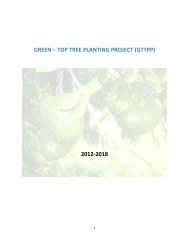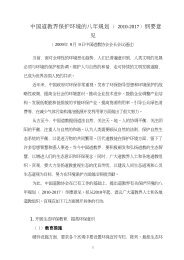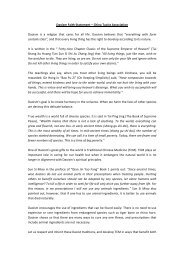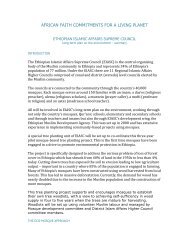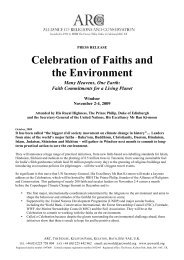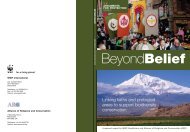summary paper - Alliance of Religions and Conservation
summary paper - Alliance of Religions and Conservation
summary paper - Alliance of Religions and Conservation
You also want an ePaper? Increase the reach of your titles
YUMPU automatically turns print PDFs into web optimized ePapers that Google loves.
These are isolated cases in which by some chance the past has been respected. Conscious protection <strong>of</strong><br />
quickly disappearing forests around concentrations <strong>of</strong> population has required specific measures. It is<br />
obvious that a clash <strong>of</strong> cultures has affected the traditionally guarded areas. Development agents have<br />
been unaware <strong>of</strong> the positive side <strong>of</strong> traditions, <strong>and</strong> young people who are caught with the attractions <strong>of</strong><br />
modern life are quick to reject what to them looks oldfashioned <strong>and</strong> ancient. Whether development is<br />
conceived as modernization or brought about by change <strong>of</strong> religion the first educated generation wants to<br />
make a full about turn. The third generation might be ready to reconsider <strong>and</strong> begin to find some<br />
treasures in the lost traditions. The problem is that any research, which would have genuinely recognized<br />
the people themselves as owners <strong>of</strong> past knowledge, has been very slow in coming.<br />
Women’s domestic economy<br />
The second thing I take up is the women’s economy.<br />
Market economy dominates development everywhere. With it follows the sole emphasis on cash crops<br />
<strong>and</strong> the dependence on fluctuating prices forcing changes in production patterns. The trend makes any<br />
resistance to it sound conservative, simplistic, belonging to the past mode <strong>of</strong> production. When<br />
companies become big transnationals outside <strong>of</strong> any state or local government control they operate with<br />
their own rules with pretence <strong>of</strong> highest pr<strong>of</strong>it calculations. In EU the politics <strong>of</strong> centralization is<br />
supposedly balanced with the subsidiary principle to strengthen the local government <strong>and</strong> even<br />
international cooperation between local communities across the continents. Some project funds soothe<br />
the minds both in the North <strong>and</strong> South to keep people active. The allocations for projects hardly<br />
counteract common people’s loss <strong>of</strong> power in their fight against prevailing expert knowledge <strong>and</strong><br />
calculations solely based on market figures.<br />
The statistics evidence that while the world is wealthier than ever before the number <strong>of</strong> the poor grows<br />
everywhere, also in industrial countries. What exactly in this situation means reduction <strong>of</strong> poverty<br />
To counteract the pursuit for wealth poverty reduction permeates today’s development discourse <strong>and</strong><br />
women become prime targets. The poor subdue to the outsiders’ view <strong>of</strong> themselves as poor in need <strong>of</strong><br />
help in hope that some good is in it for them. Instead <strong>of</strong> identifying women as prime actors <strong>and</strong> active<br />
contributors they are made targets.<br />
Poverty is indeed a central problem in today’s world, <strong>and</strong> people deserve better life, but poverty as the<br />
characterising epithet <strong>of</strong> two thirds <strong>of</strong> the world is <strong>of</strong>fensive to them <strong>and</strong> being labelled poor robs people<br />
<strong>of</strong> their selfconfidence. Many people with scarce resources feel that they live more satisfactory, mutually<br />
caring life than the wealthy but dissatisfied people <strong>of</strong> the rich world. Furthermore, an increasing number <strong>of</strong><br />
the world’s wealthiest individuals live in the countries called poor.<br />
The concepts <strong>of</strong> who are poor also vary. The male assistant <strong>of</strong> the Minister <strong>of</strong> Foreign Affairs <strong>of</strong> Tanzania,<br />
took me to my former research villages from 30 years ago, among them today’s President’s home village.<br />
I saw little change since our time <strong>of</strong> study but my host did not think that people there were poor. In his<br />
view the women had their children, they grew their food, they had their houses <strong>and</strong> water, <strong>and</strong> there were<br />
some shops for buying goods. He could have added that their social life, celebrations <strong>and</strong> rituals<br />
enlivened their lives.<br />
Different cultures’ views about satisfactory life vary. The show <strong>of</strong> wealth today in many Asian cities<br />
bypasses any present or future show <strong>of</strong> wealth in countries like Finl<strong>and</strong>, a country <strong>of</strong> unassuming, lowkey<br />
people, where the custom is not to brag with wealth. A Nepalese student <strong>of</strong> development studies visiting<br />
my home made the discovery that development did not need to mean luxury or a modern house. He<br />
could idenitify our renovated grey log houses as development, “Just what we have at home”, he put his<br />
thoughts into words.<br />
In the economic language poverty is measured by counting the value <strong>of</strong> the marketable produce in ratio to<br />
population. Women’s domestic work <strong>and</strong> much <strong>of</strong> their productive work remains unaccounted for. Informal<br />
calculations evidence that it even surpasses the <strong>of</strong>ficial GDP figures. 9 Rural people still live largely in<br />
subsistence economy <strong>and</strong> informal economy is the rule. In a country like Tanzania most production <strong>of</strong><br />
9<br />
I refer to the calculations <strong>and</strong> the writings <strong>of</strong> Hilkka Pietilä on the subject.<br />
37



